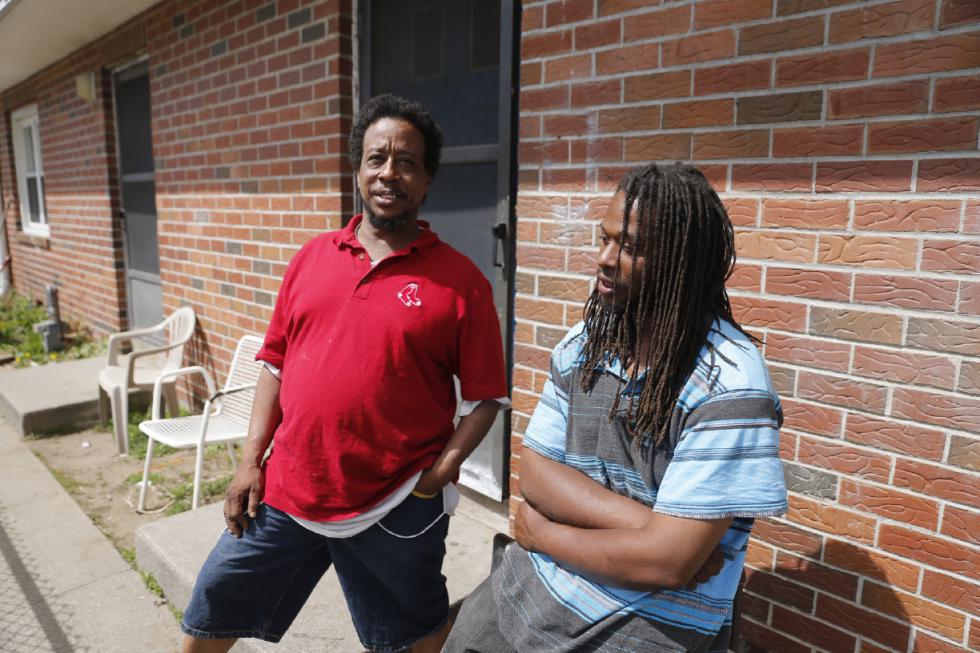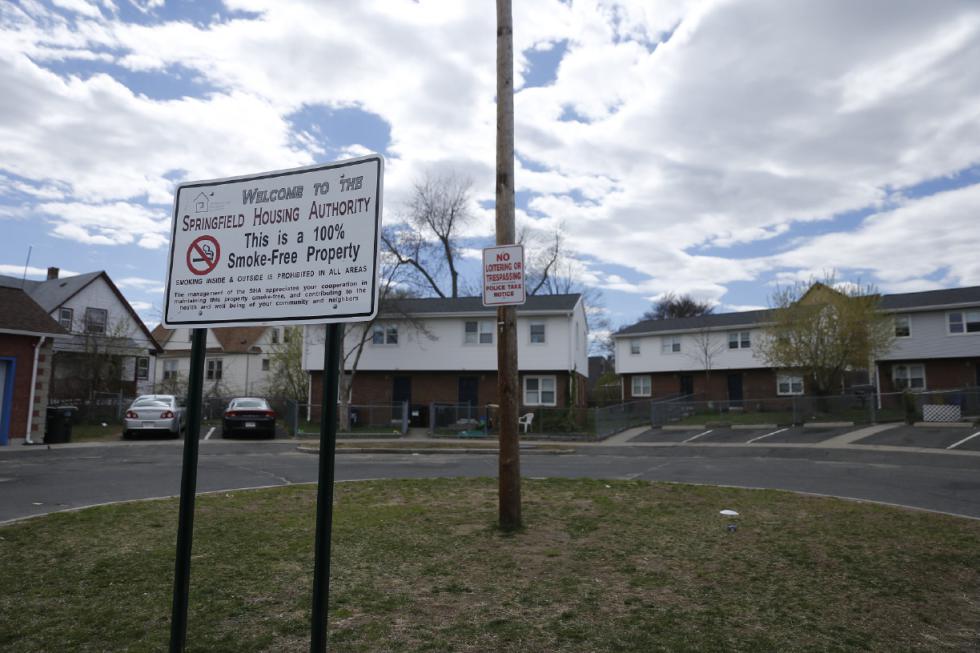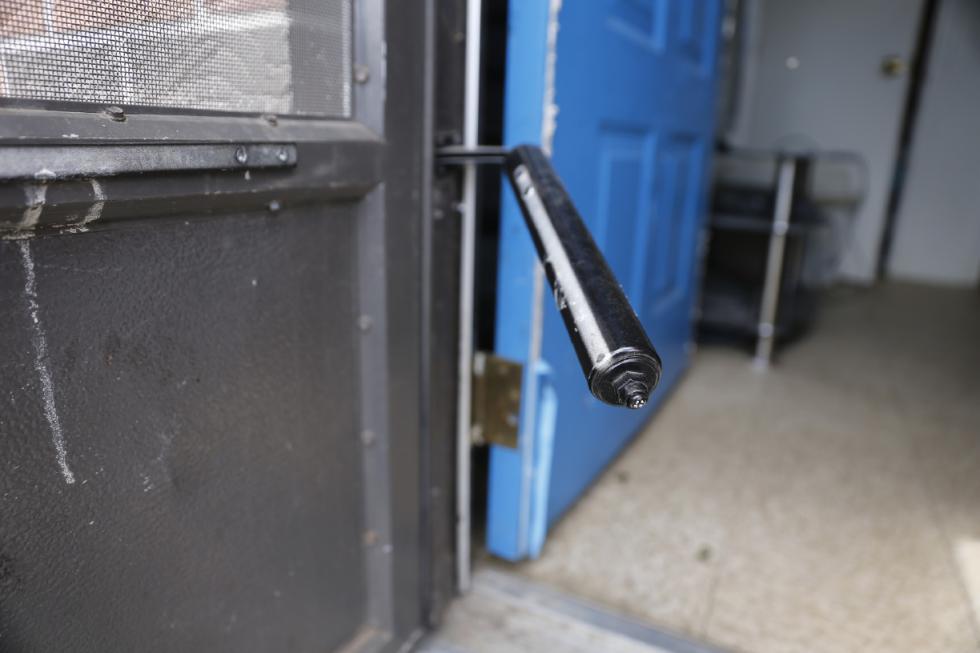In a public housing complex specifically designed for the elderly and disabled, something as basic as a wheelchair ramp to the common community space should be part of the facility on day one.
But it took the Agawam Housing Authority nearly seven years to install one at Countryview Estates. All the more surprising, the lag went without public scrutiny in a town that neighbors Springfield — once home to now-jailed former housing director Raymond Asselin.
One resident said the ramp became a point of contention between the residents and executive director Maureen Cayer. The resident explained that those who live at Countryview are elderly, sick, don’t move around well, and shouldn’t have to fight for something so basic.
“We asked for a ramp and it took six and a half years to finally do it,” said the resident, who requested anonymity for fear of losing housing. “That’s not right.”
In an interview with the Advocate Cayer said the state procurement process takes a long time to work through and the ramp was part of a larger project.
Several residents I spoke to said they stopped going to Cayer for help because it doesn’t seem to do any good — a simple ramp took six and a half years to install — and conversations often end in arguments.
The Agawam Housing Authority has a history of poor management. A state audit from 2007 cites a slew of questionable expenses and dubious record storage under former director Christian Quatrone. In the most recent state audit, from 2011, Suzanne Bump noted “excessive delays” in turning over the authority’s vacant units as an ongoing issue in Agawam.
“[Cayer] runs this place, so she could do anything to me that she wanted. There doesn’t seem to be any oversight. Her bosses are all in Boston and they’re only looking at the numbers.”
And there’s the problem.
There’s virtually no one watching over the state’s housing authorities. The quasi-public and uber-secret municipal agencies manage million-dollar budgets with a director, possibly a few maintenance personnel, and a volunteer board, while the state department charged with overseeing the program, the Department of Housing and Community Development, holds its hands in the air and steps back.
And there’s about to be even less oversight of a program that is infamous for corruption and embezzlement to the detriment of the low-income, elderly, and disabled people who rely on it. The State Auditor’s Office is backing off on investigations of municipal Housing Authorities due to policy reform. A spokesperson at the DHCD said new oversight requirements “haven’t kicked in yet.”
It’s not like nothing’s happened to warrant skepticism. There have been several breaches of taxpayer trust in the past decade and the most serious of these breaches occurred in Springfield, no less. In 2004, former Springfield housing director Raymond Asselin was jailed for a $1 million system of bid-rigging, kickbacks, and bribes. In July 2013, Chelsea Housing Authority’s executive director, Michael McLaughlin, was sentenced to three years in federal prison for diverting renovation funds to pay his $360,000 salary, though he was only reporting a salary of $160,000.
These two cases are the most pressing, though the Boston Globe reported other troubling mismanagement in October 2012, calling attention to Easton’s former director for flirting via email with various men while she should have been attending to in-need apartment buildings; a director in Winchester who was working a second full-time job as an attorney; and a Peabody director caught by TV cameras spending much of the work week in clubs and bars.
In the cases of Springfield and Chelsea, it seems — either by direct knowledge or lack of effort — the boards were complicit in the actions of the housing executives, and so were asked to resign.
“They trusted the executor director of their time and that proved to be a problem,” said Ray Warren — current Chairman of the Springfield Housing Authority’s Board of Commissioners — of the former Springfield board, which failed to see the corruption in the Asselin case. “But they were good, honest people. They were told a story and they went along with it. They had no idea it was a crooked operation.”
Local housing authorities — funded by state and federal governments with over a billion dollars per year in Massachusetts — are surprisingly vulnerable to fraud and other mismanagement. The authorities are run by executive directors, for which hiring and firing power falls to an appointed local board that is largely unpaid, save for a small stipend. The stipend varies from authority to authority, though most fall in the $1,000 a year range. These five-member boards meet once a month and fulfill their oversight duties by reviewing a packet of documents provided to them by the authority. These packets are often riddled with jargon and involve considerable back and forth with authority staff deciphering them involves, according to Warren.
“Sometimes it’s very, very complicated stuff,” he said, adding that site visits and a more hands-on approach is often warranted, though that time is not paid for.
Four members of the five-member boards are appointed by the mayor and the fifth members are appointed by the governor. Warren, a mayoral appointee, said he was last appointed to a four-year term in 2004. Since then, he said, he has neither been reappointed nor replaced, yet he continues to do his job as charged.
But somewhere between the Springfield and Chelsea incidents, the commonwealth took notice and initiated reform. Chris Thompson, a spokesperson for State Auditor Suzanne Bump’s office, said Bump is no longer handling regular audits of the state’s housing authorities. Formerly, he said, Bump audited every housing authority in the state every two to three years. Now, however, she audits housing authorities only “on a discretionary basis.” Instead, he said, reformed regulations require each authority to conduct independent audits and report them to the state’s Department of Housing and Community Development. A spokesperson for the DHCD says those reports have not “kicked in statutorily,” meaning they are not yet mandated by the state.
In 2012, Deval Patrick issued an executive order to establish the Public Housing Advisory Commission — tasked with developing recommendations for reform of the state’s public housing authorities. Upon their recommendation, the Patrick administration filed legislation to regionalize all local housing authorities in the commonwealth. The legislation was met with significant resistance. The administration and the legislature negotiated the acts of 2014, which called back the Public Housing Advisory Commission and formed five working groups charged with addressing staff training, performance, capital assistance, tenant services, and regional innovation.
Meanwhile, residents say they haven’t felt a difference.
Another Agawam Housing Authority resident called specifically to assert that the authority is not being well-run and that the elderly living there are unfairly treated. And that no one seems to care.
“This is senior housing — you work all your life for what?” she said. “It’s not fair to the seniors. Boston should come down here and see what they really do. They should do something about the people that run this place.”
Christine Quink, who recently applied for housing in Agawam on behalf of a loved one — for whom she has power of attorney — has filed a formal complaint against Cayer with MCAD. Quink says Cayer discriminated against her in a time of need by speaking harshly to her and questioning the integrity of every document submitted, before ultimately denying the application for housing.
“It was like a full-time job trying to satisfy her,” Quink said.
Cayer, though declining to comment on the MCAD complaint, said she is often criticized for the amount of time it takes to fix things and to turn over empty units, and for enforcing necessary rules. She said the authority’s staff is small and she and her three-person maintenance staff must field the needs of 242 units.
“There’s no barrier between me and my staff and my residents,” Cayer said. “It was explained to me at the time of my hire that an open-door policy was critical to the health of this agency. Nobody walks into the housing authority having a great day, and I should always remember that and treat people accordingly.”
Cayer has plans to meet with advocacy group Massachusetts Union of Public Housing Tenants ”to discuss the establishment of a local tenants’ organization.” She said last year the local chapter of the tenants’ organization was dismantled after its president fell sick.
“It’s important they’re given a voice, so things aren’t done to them — they’re working in concert,” Cayer says.
Residents also complain of empty units going unfilled at the authority — an ongoing issue noted in state audits.
“It’s hard to keep up, because I have two full-time maintenance men and a working supervisor and there’s not always enough time in the day to get everything done that needs to be done,” said Cayer, adding that hiring additional employees is not an option, given her budget. She said turning over units in a more timely fashion is something she and her staff are working on.
“Right now we work within our budget and get everything done that we can,” said Cayer. “I think initially we were just putting out the fires, but now are in a way working on preventative maintenance.”
Cayer said she loves her job, but it can be difficult and she sometimes has to do things she doesn’t want to, like reprimanding and evicting people.
“My job is not to make people homeless,” said Cayer. “We wear a lot of hats, and sometimes it’s difficult. We don’t live in a utopia. No matter where you live there’s going to be something that irks you. The tenants’ group will be able to take those complaints and address them before they become real bones of contention and anger. I know I’m never going to be able to please everyone, but the one thing I try to do is listen and be honest. If I can help you I will. If I can’t, I can’t. I tell people a lot that I was given an opportunity to do this job by a board that trusted that what I said in an interview was true, that it wasn’t about me filling the room with sunshine. They gave me an opportunity to do this, and I truly like what I do.”
Regarding past transgressions in Springfield and Chelsea, Cayer said: “People do dumb stuff all the time, but most of us come to work everyday with the purpose to do what we’re charged with.”
Greenfield Housing Authority residents also referred to ongoing tensions between them and the staff, giving credence to the notion that authority staff and residents not getting along might be the nature of the beast.
Jason Rivard, 38, said Nadia Baraban, an employee for the Greenfield Housing Authority heavily involved in the Oaks Courts property, favors the many Moldavian residents living in the apartments there. “She’s not a nice lady and she’s not doing a good job,” says Rivard. Rivard is one of several residents who complained of Baraban’s manner and of a perceived bias towards the Moldavians. “It’s the projects — it’s never going to be perfect. Most of us are poor. We struggle even being here sometimes.”
Dan Finn, executive director at the Greenfield Housing Authority, said Baraban is doing her best to maintain standards.
“She does her job,” said Finn. “Our mission is to provide people with safe, sanitary housing, and our goal is to provide housing opportunities, not to take it away from them.”
In answer to complaints from residents that their voices aren’t heard, Finn claimed otherwise.
“We have a lot of clients and the doors are open,” Finn says.
Rich Fahey, the Greenfield Housing Authority’s chairman of the board of commissioners, urges any residents with issues to come to one of their monthly meetings. Fahey recommended calling the authority ahead of time to get on the agenda, though he would not turn anyone away who had not gone through the proper channels.
“We’re not so formal that we wouldn’t listen to someone who came in with a complaint,” said Fahey. “You’ve got to speak up, and we’re very open — there’s no secret business being conducted. Everyone on that board is a native of Greenfield. We want to help and we feel we are.”
Fahey said the only good thing that came of the Chelsea scandal was that everyone is more attuned to the details now. “People became very, very aware when the Chelsea story came out a couple of years ago,” Fahey said. “If there’s an up side to that, it’s that it got rid of the bad apples. They’re being watched and they’ve got to be on the straight and narrow.”
Though it took the most egregious incidence of housing authority corruption to set a precedent, the Springfield Housing Authority operates now with intentional integrity.
Following an impromptu meeting around at the home of newly inaugurated Springfield mayor Charlie Ryan — during which Ryan detailed the corruption of the Asselin administration to him and Tim Babcock and asked them to take over the board, Warren recalled — a stunned Babcock turned to him on the steps in front of the home and said, “ ‘I don’t know about you but I am all about integrity in this situation.’ I said me, too, and that’s kind of how we operated from then on.”
Warren has chiefly been responsible for turning things around since then, and he said it’s been no easy task.
“It doesn’t come around because you say so, it comes around because — transaction after transaction after transaction — you prove it,” said Warren. “The Springfield Housing Authority was abusing its authority. Boy, once you alienate the people who are in great part funding you, it takes a long time to get back — a long, long time.”
“The only way to do it is brick by brick,” said William Abrashkin, executive director of the Springfield Housing Authority. “When something like that has been going on at the top for decades, the physical loss can really disrupt the mission and the culture of the entire agency. It affects everything from enforcement to workforce standards, living standards, efficiency, transparency, and the place was really not just the victim of theft but its mission was deeply corroded, and there’s nothing automatic about rebuilding from that point.”
Abrashkin said strategic hiring has been pivotal to getting things back on track. He said he’s also worked to insert checks and balances into their operation and rebuild relationships within the community.
“In any walk of life, cheating, corruption, and theft are very, very hard to prevent,” said Abrashkin, a former judge. “And there’s no magic bullet to do it, but there are important steps that people can and should take. It’s all in the people. What is needed is a mechanism of practices for hiring people of honesty and integrity. We hire very, very carefully. If you have honest people you don’t have to worry about cheating.”
Abrashkin said he thinks everything that can be done to prevent another Asselin or McLaughlin is being done.
“McLaughlin paid off inspectors — can you totally prevent that? No,” said Abrashkin. “It’s a human system — it’s not perfect, but it’s very good. The incidence of problems and corruption are very scarce and very rare when you look at the hundreds of directors across the state.”
Hopefully, now that the commonwealth has seen what happens when heads are turned, mayors and the governor will carefully appoint commissioners who are willing to ask tough questions and put in the work.
“[Abrashkin] has one job — I have a different job,” said Warren. “He knows what I’ve been through makes me feel an extra sense of responsibility to keep an eye on things, and I ask a lot of questions, probably to the point that I annoy them. But that’s my job.”
“You’re not going to sneak anything by Mr. Warren,” said Abrashkin, with a tone of caution.
After over 11 years on the board, Warren said he’s taken the task seriously from day one because he saw the disarray the authority was in thanks to Asselin.
“I was really pissed,” said Warren. “That’s what really motivated me — the arrogance, the sense of entitlement people felt to do what they did with other people’s money. I knew it could be better and it had to be better.”
Abrashkin and the other directors say the actions of Asselin, McLaughlin and the few others have given off a negative image of their profession, but that the majority of directors do their job with care.
“The overwhelming majority of housing authorities are staffed by wonderful people doing tough jobs, always short of funds and doing the best they can,” Abrashkin said.
Abrashkin said that although their actions were terrible, they’ve forced the community and members of the press to look more closely at what happens in housing authorities, which can only be a good thing.
“Of all the things I said, one of the main things is public scrutiny,” said Abrashkin. “We want the fourth estate to look closely at what we do. And if there are problems, we want them to be uncovered.”•
Contact Amanda Drane at adrane@valleyadvocate.com.










